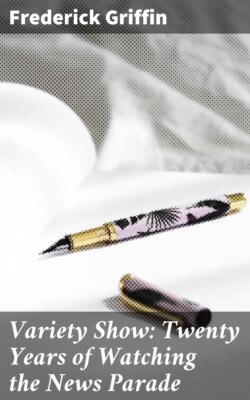Читать книгу Variety Show: Twenty Years of Watching the News Parade - Frederick Griffin - Страница 8
WAR CORRESPONDENT
ОглавлениеONE December morning in 1916 the City Editor sent me to see E. R. Wood, president of a trust company, about a rumoured development in Canadian aviation to help on the War. He was a member, it appeared, of the Imperial Munitions Board which had been created to handle the manufacture and delivery of Canadian supplies to the British Ministry of Munitions.
J. W. Flavelle, packing magnate and noted organizer, later to become Sir Joseph Flavelle, Baronet, for his war services, was chairman.
“We have a scheme in mind,” said Mr. Wood, “but Mr. Flavelle is in England and won’t be back until next week. He has to endorse it. See me then.”
Thanking him, I started for the door. He came from behind his desk, began suddenly to talk and to my surprise told me the plan. Why, I do not know; mine not to reason then about distinguished men’s moods. He said that the Dominion planned to build aeroplanes and to establish flying fields, with barracks, for the training of army pilots. Exciting news, you may be sure, with so many Canadians entering the British Air Forces. I knew enough to hold my tongue and let him talk, which was intuitive wisdom; left at the right moment, and turned in what proved a scoop that was featured on Page One. When, following up the story, I saw Mr. Wood again he accused me of having broken faith by printing it. I argued he had merely said that Mr. Flavelle had to endorse the scheme but had not told me not to publish it. The incident ended with him laughing good-humouredly, as much at himself as at me.
Two or three days later the City Editor gave me a contingent assignment.
“Flavelle’s just back from England,” he said, “where he’s been conferring about shells with Lloyd George. He’s to address munitions manufacturers this afternoon in the Board of Trade rooms. Drop over and get a line on it. It probably won’t be much and you probably won’t get in, but have a chat with Flavelle about that aviation story.”
The Board of Trade auditorium was on the eighteenth floor of the Royal Bank Building, at the corner of King and Yonge Streets, the hub of Toronto. It was the tallest building in the British Empire then. The Star office was less than a block away.
The meeting was about to start when I got there. The door was unguarded; entering, I took a rear seat. Some two hundred men were present, presumably interested in making munitions. Shells, I knew, were news. There might be something in this, but I made no attempt to take notes. Flavelle was my aim, afterwards.
It began without liveliness. The Inspector-General of Munitions, a Col. Edwards, recently appointed, and C. W. (later Sir Charles) Gordon of Montreal spoke briefly. Then Mr. Flavelle arose. Almost immediately he launched into an harangue.
Generally, he said, the munitions makers were not making British delivery as promised. They were falling down in their war effort, failing the Allies. Worse than that, he went on, some of them had been forwarding shells which did not fit guns. In English dumps, he declared, he had seen stacks of Canadian-made shells piled there useless. A waste, he exclaimed, and criminal in wartime.
So far he had spoken quietly if strongly. All of a sudden he turned as emotional as a gospeller. Few preachers put into their pleas for souls the fervour with which he talked about shells. Tears showed in his eyes.
Sir Joseph Flavelle, one of the most notable contemporary Canadians, has been the victim of much mixed opinion but always to me he has been the weeping patriot of 1916.
“On board ship coming back from England,” he cried, “I was unable to sleep at night thinking of the enormity of the offence of which some of you, either through carelessness or ignorance, have been guilty. I cannot think that any of you erred wilfully; that would be dreadful. It must have been inexperience.”
Dramatically he told of British soldiers, Canadian gunners, killed by the explosion of defective shells in their own guns.
Passionately he raised his voice. “If any of you,” he shouted, “any of you men here, have been deliberately guilty of sending forward such a shell, I could almost wish that it might explode—right here in our midst—bring these walls down—and blow us all to perdition—rather than in the ranks of our own men.”
His words rose and fell, laden with feeling. The audience held itself tense. Men sat stiffly, not daring to look at a neighbour, afraid of seeming to accuse, afraid of sensing accusation. The manufacture of shells was a new thing for Canadians. Plants making knitting needles and plants making tea kettles had been swung joyfully into the making of munitions.
This, I knew for all my lack of experience, was a story, with Canadians by the thousand at the front and every second or third family in the land interested in their living or dying.
